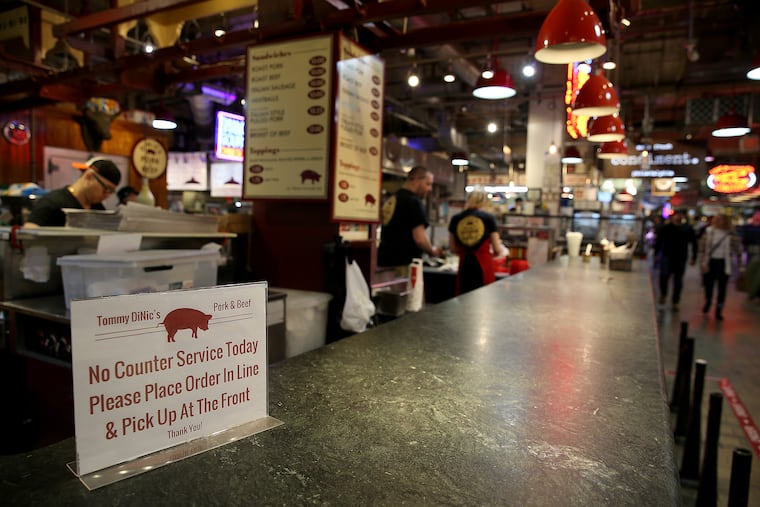Philly orders sweeping shutdown of businesses and city services as coronavirus spreads
Philadelphia Mayor Jim Kenney has ordered all nonessential businesses to shut down by 5 p.m. Monday and said the city will halt all nonessential government operations by Tuesday, in the city’s most aggressive steps yet to slow the spread of the coronavirus.

Philadelphia Mayor Jim Kenney ordered all nonessential businesses to shut down by 5 p.m. Monday and said the city will halt all nonessential government operations by Tuesday, in the city’s most aggressive steps yet to slow the spread of the coronavirus.
Restaurants will only be allowed to offer take-out and delivery service. Most retail stores will shutter through at least March 27. City government offices will be closed to the public, and only essential government employees will report to work. Only businesses classified as “essential” by the city, like supermarkets, gas stations, banks, post offices, daycares, and veterinary clinics will be allowed to remain open, officials said.
“These changes will disrupt life in Philadelphia, and we do not make these changes lightly,” Kenney said at City Hall.
Essential government services that will continue include public safety, health and human services, utilities, sanitation (including trash collection), and finance and payroll, City Managing Director Brian Abernathy said.
Soon after Kenney announced the city shutdown, Pennsylvania Gov. Tom Wolf said that he was calling on nonessential businesses to close down across the state. While Wolf specified that the state will not be enforcing his shutdown recommendations, city officials said they may use emergency authority to close or penalize businesses that fail to comply with the municipal shutdown order.
Philadelphia’s court system also announced the suspension of all non-emergency proceedings for the rest of the month. All civil and criminal trials will be postponed until at least April 1, along with jury service, most pre-trial hearings, and diversion programs.
Taken together, the measures amount to a broad and sweeping shutdown of life in the city, where there had been nine confirmed cases of the virus as of Monday. That number is expected to grow rapidly as testing capabilities ramp up. There are at least 44 cases of the virus in the Philadelphia region, and at least 65 in Pennsylvania. New Jersey has about 100 cases, the majority of which are concentrated in the northern part of the state.
"Philadelphia is joining five other Pennsylvania counties so we can get back to normal,” Kenney said, referring to policies designed to slow the spread of the virus and keep hospitals from being overwhelmed by waves of sick patients, which strains resources and drives up mortality rates. “It might be a while, but we’ go on from here.”
Philadelphia is joining five other Pennsylvania counties — four of which border the city — and the entire states of New Jersey, New York, Maryland, Delaware and Connecticut in ordering the closure of such establishments as the U.S. combats the virus.
“Many, many of the restaurateurs I’ve talked to personally are in favor of this,” Kenney said.
City officials offered no details Monday about enforcement measures or whether inspectors from the Health Department and Licenses & Inspections would patrol to check for compliance. The city established a phone line (215-685-7495) for residents to report businesses that are violating the order. “Businesses that do not comply would be subject to Health Department violations,” said Mike Dunn, a city spokesperson. City law grants health inspectors the authority to order the immediate closure of food establishments when they find a threat to public health.
Abernathy said Kenney has “broad authority over these closures” and that the city will have inspectors “prepared to enforce” should non-essential businesses stay open.
When asked if the city would arrest business owners for not complying, Abernathy said: “I can’t imagine we’ll get to that point.”
“We are doing everything we can do to flatten that curve so we can get back to normal,” Kenney said, referring to policies designed to slow the spread of the virus and keep hospitals from being overwhelmed by waves of sick patients, which strains resources and drives up mortality rates.
As Kenney announced the shutdown, some city staff members in attendance held sanitizing wipes or wore gloves to protect themselves. Abernathy at one point used a bottle of hand sanitizer on the podium as he addressed reporters.
Public health officials say the mass closures help slow the spread of the new coronavirus so health-care systems don’t get overwhelmed. Mass nationwide lockdowns have been instituted in Europe, and U.S. officials have not ruled out such a move.
In Philadelphia, Kenney had previously been more reluctant than state officials to adopt aggressive measures to limit public gatherings. Bars and restaurants remained open throughout the city over the weekend, though many owners in Philadelphia took it upon themselves to close or take steps to protect customers and employees while preserving their take-out and delivery business.
Prior to Monday, Kenney’s administration had banned all events with 1,000 people or more and discouraged events with more than 250 people. On Sunday, the U.S. Centers for Disease Control and Prevention issued a guidance that all events with more than 50 people should be canceled or postponed for the next eight weeks.
At a news conference Saturday, Kenney recommended people “go out and have dinner — and tip your waitstaff because they’re struggling right now.” But Monday morning, Kenney said he made those remarks “two days ago.”
“The issue is evolving every hour,” he said.
Wolf addressed the tension Sunday, saying “there will be disagreement” and that he would “continue to... talk with the mayor and his administration to make sure that we are on the same page when it comes to addressing the needs of this crisis."
-Inquirer staff writers Maddie Hanna, Michael Klein, and Jeremy Roebuck contributed to this article.